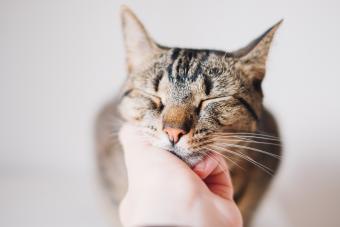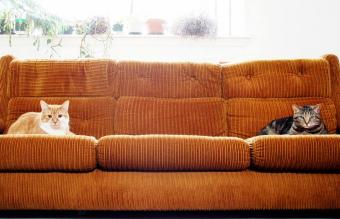
Old wives' tales and myths about cats have swirled around for centuries. One of the most enduring and intriguing is the idea that cats steal your breath, or your baby's breath, while you are sleeping. This belief has instilled fear about cats and has often been used as a plot device in horror movies and stories. Before you start locking your bedroom door and not allowing your cat in bed with you, it's important to know it's just a myth.
The Origin Story
This myth has deep historical roots, with variations present in different cultures. Many of these superstitions were developed in a time when the natural behavior of cats was misunderstood, leading to the creation of numerous unfounded folk tales. The concept of a cat stealing breath likely originated from the observation of cats curiously sniffing their owners' mouths, especially when they were asleep.
Everyone has heard the phrase, "Cats have nine lives." This superstition began when Beware of the Cat was published in 1584, where nine was the number of times a witch could shapeshift into a feline.
Curiosity of the Cat
Cats have an excellent sense of smell, and they often use it to gather information about their environment and people around them. This curiosity can lead them to sniff a sleeping owner's mouth.
Additionally, they may be attracted to the warmth of your breath, the smells from the food you've eaten, or milk your baby consumed. It's also worth noting that cats are fond of cozy, warm places, and your sleeping body is an appealing heat source.
Debunking the Myth
There's no scientific evidence to suggest that a cat is capable of or interested in stealing a person's breath. It's important to differentiate between old superstitions and facts about our feline companions. Cats are not supernatural creatures. They're just curious, affectionate pets.
Your Baby's Safety
While the breath-stealing myth isn't true, it's important to prioritize safety when allowing cats to sleep with young children or infants. Cats may unwittingly pose a suffocation risk to babies, not through any supernatural breath-stealing, but simply by lying too close to the baby's face.
Infants do not have the ability to roll over on their own, and cats are large creatures relative to a baby's small size. Never allow your cat to sleep with your infant, or to play with your infant unsupervised. Cats also pose a risk for transmitting disease, so it's best to play it safe. In general, keep cats out of the cribs or beds of very young children.
When your newborn or infant is in their crib, supervise their bassinet to prevent any of your pets from getting in and restricting their breathing.
Society's Perception of Cats
Cats have, at times, been subject to negative social perceptions, often stemming from superstitions, cultural beliefs, or misunderstandings about their behavior. In certain cultures, cats - and particularly black cats - are associated with bad luck or witchcraft.
This perception can lead to stigmatization and even mistreatment of these animals. Similarly, misunderstandings about feline behavior can fuel negative views. For example, this myth about stealing breath comes from a lack of understanding about felines. During the Black Plague in Europe, cats were even persecuted for spreading disease, when they could have helped control the actual source: fleas riding around on rats.
An Old Misunderstanding
The myth of cats stealing your breath is nothing more than a combination of misunderstood feline behaviors and human superstition. As we understand more about our feline friends, we can appreciate their quirks and habits, dispel unfounded fears, and ensure the safety and comfort of all family members. So, the next time your kitty settles down for a purr-filled sleep on your chest, you can rest easy knowing they're there for love and warmth, not to steal your breath.
Interested in animal myths? Check out these dog myths and superstitions.







